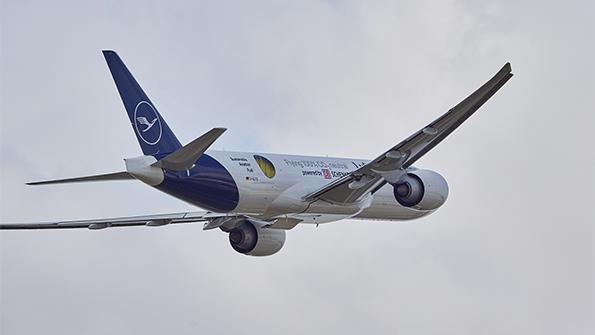
Electricity and hydrogen are keys to the long-term sustainability of aviation. The question is how. The extent to which electric and hydrogen propulsion can contribute to net-zero carbon emissions by 2050 or earlier is debatable.
But renewable electricity and green hydrogen are almost certain to play a large role in the decarbonization of aviation via another route: synthetic fuels, also known as power-to-liquid (PtL) fuels, electrofuels (e-fuels) and e-kerosene.
To enable synthetic fuels to fulfill their sustainability promise, however, the aviation industry must fight for its share of renewable energy and hydrogen electrolyzer capability and secure a level playing field on which to battle other sectors reluctant to be weaned off liquid fuels.
Germany has fired the first shot. As the European Union prepares to release its ReFuelEU legislation to boost sustainable aviation fuel (SAF) supply and demand, a coalition of environmental and industry organizations, including Lufthansa, is urging that now is the time to set an ambitious target for e-kerosene.
Reports suggest the EU will mandate that all flights departing European airports use 5% SAF by 2030, rising to 63% by 2050. A submandate for e-fuels could begin at 0.7% in 2030, increasing to 25% by 2050. That is not fast enough, argues the coalition in a letter to the European Commission.
Synthetic fuels are a subset of SAF. But instead of being produced from biomass and achieving emission reductions over the life cycle of carbon, a net 60-80% for most bioderived SAFs, e-fuels are produced from electricity, hydrogen and carbon dioxide and are carbon-neutral—the CO2 emitted by combustion is the same amount captured and used in production of the fuel.
“We therefore call for the ReFuelEU initiative to send a clear market signal for e-kerosene from green hydrogen, through a binding mandate for the use of such fuel commencing in 2027 at 0.5-1% delivered to the EU market. The mandate could potentially rise to 2.5% in 2030,” says the letter, signed by European environmental group Transport & Environment and German-led Global Alliance Powerfuels, which includes Lufthansa and the European Cockpit Association pilots’ group.
Germany is pushing hard for e-fuels because it lacks the resources to produce biofuels on the scale required. It also lacks the renewable energy and hydrogen production capacity but has agreements in place to use Africa’s abundant solar energy and to import green hydrogen. Industry has ambitious plans to commercialize synthetic fuels, with German startup Hy2gen alone planning to build six plants across Europe.
But synthetic fuels have a problem. They are less mature and more expensive than bioderived SAFs, which are themselves more expensive than fossil kerosene but are ready for scaling up to commercial production levels that will bring down their cost. That scaling up is finally underway and gaining momentum, but synthetic kerosene plants are not expected to come online until the second half of this decade. “Having a mandate starting only in 2030 will unnecessarily delay these developments,” the letter says.
A strong EU mandate for e-kerosene is important, but Germany is not waiting. In May, the federal government and German aviation association BDL signed the PtL Roadmap. This lays out the necessary steps to scale up power-to-liquid jet fuel production to at least 200,000 metric tons (670 million gal.) by 2030—one-third the current fuel requirement for domestic flights in Germany. The road map includes government support for building demonstration and pilot plants, defining sustainability criteria and setting binding targets for the production and purchase of PtL aviation fuel.
Such agreements are important, as aviation will face stiff competition for synthetic fuels—despite the market penetration of electric vehicles. Porsche for one is backing e-fuels as the route to decarbonizing the world’s cars.
But hydrogen-based fuels should be prioritized for sectors such as aviation that are difficult to electrify, recommends a May report by the Potsdam Institute for Climate Impact Research. Compared with direct electrification, e-fuels require up to 14 times the electrical generation capacity and could increase greenhouse gas emissions if electricity is not 100% renewable, the researchers said.
Hydrogen-based fuels also will be expensive and are unlikely to become cost-competitive before 2040—and then only because of increasing prices levied on CO2 emissions. “This is too late for sectors where direct electrification alternatives exist,” the researchers say. This suggests aviation has a window of opportunity to secure government support for e-kerosene as a route to sustainability.





